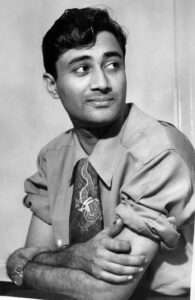DEV ANAND @ 100
On the occasion of Dev Anand’s 100th Birth Anniversary, we celebrate the life and legacy of a Bollywood legend who left an indelible mark on the silver screen. With his charismatic entry into Indian cinema in the mid-1940s, Dev Anand embarked on a journey that would define an era.

The Big Break
Dev Anand’s meteoric rise to fame was cemented with his breakout role in “Ziddi.” This role catapulted him to stardom, making him one of the most beloved mainstream actors of the 1950s. What set him apart was his unique style of acting, characterized by charming mannerisms that resonated deeply with audiences. His distinctive dialogue delivery, combined with a penchant for fashion, made him a true style icon, effortlessly donning a myriad of captivating attires.
The Romantic HERO
However, it was Dev Anand’s on-screen romantic image that truly endeared him to the masses. He portrayed love with an authenticity that made hearts flutter. His chemistry with leading ladies was electric, leaving an indomitable mark on the world of Indian cinema.
The Soulful music of his films
Music was a perpetual attraction in his films, and his collaboration with the Burmans, especially S.D. Burman, resulted in timeless melodies. The golden voice of Kishore Kumar became synonymous with Dev Anand, making him an eternal icon whose tunes still serenade generations.
A Visionary
Dev Anand wasn’t just a remarkable actor, he was a visionary ahead of his time. He conceptualized and brought to life classics like “Guide” (1965) and ventured into unique projects such as “Tere Mere Sapne.” He tackled groundbreaking themes in “Hare Rama Hare Krishna” and even ventured into directing, leaving a profound impact on Indian cinema.
A True Icon of India Cinema
Dev Anand’s centenary is not just a celebration of a life well-lived but a tribute to an icon who transcends generations. His contributions to Indian cinema are etched in gold, a testament to a legendary actor and a visionary who continues to inspire and captivate the hearts of cinema enthusiasts.
Also, on this occasion, read about Dev Sahab’s finest, “Guide” (1965),
from the Classics section, here’s the link
#DevAnand #Evergreen

Leave a Reply